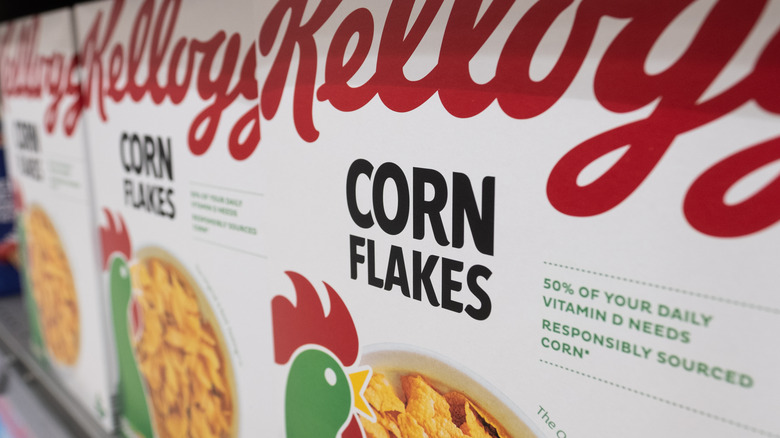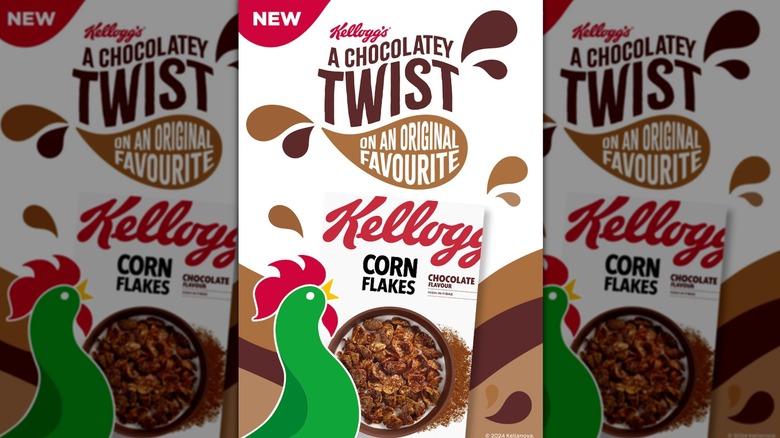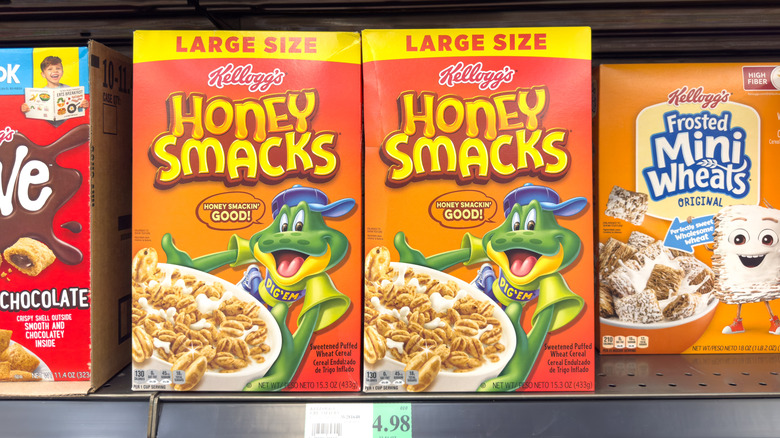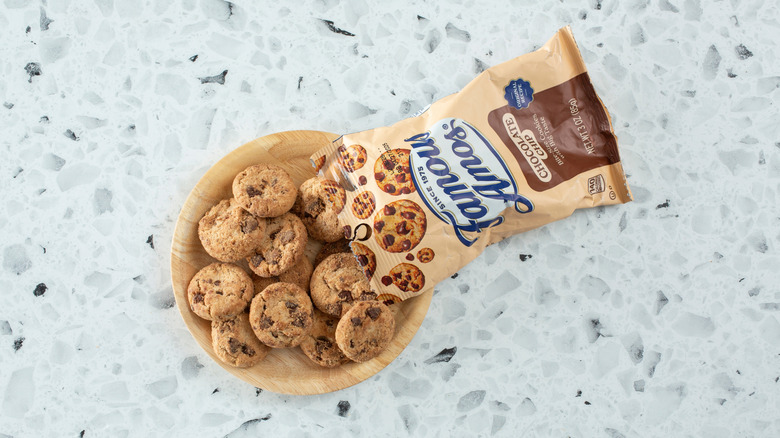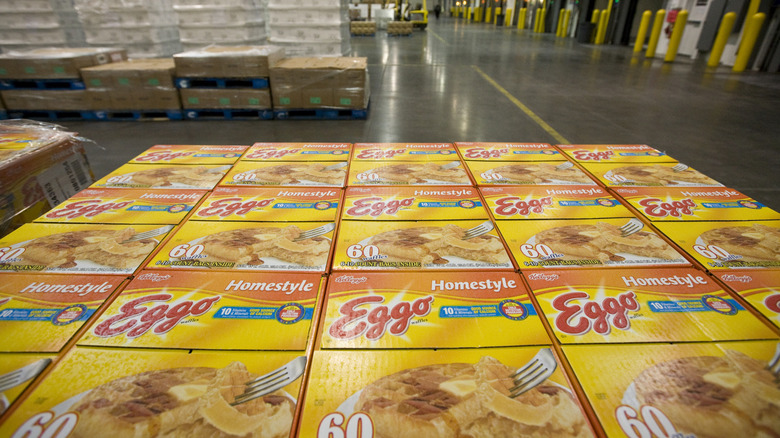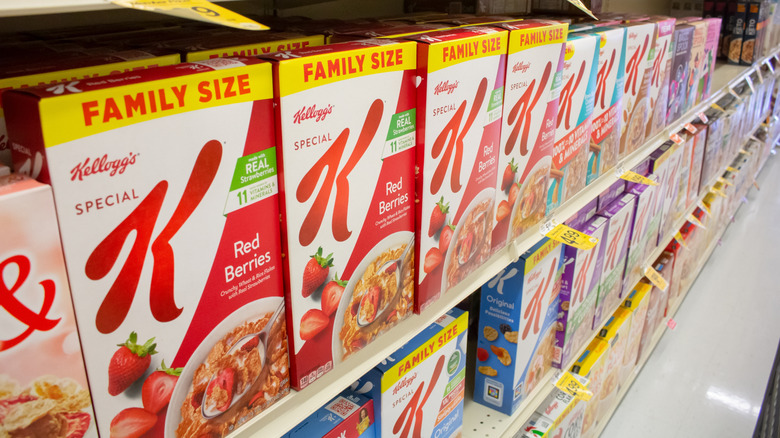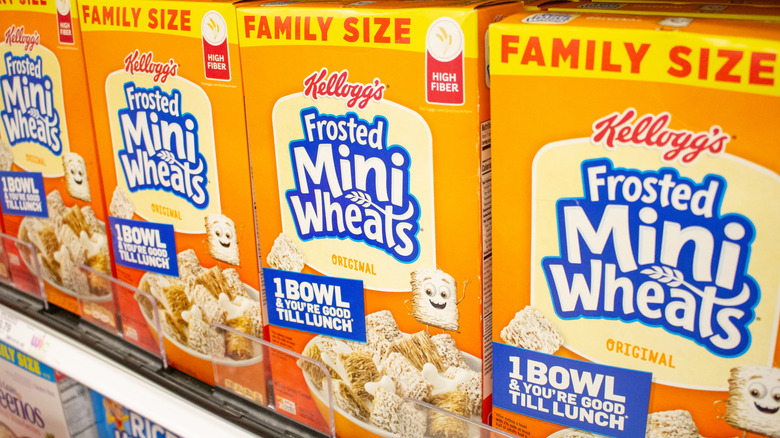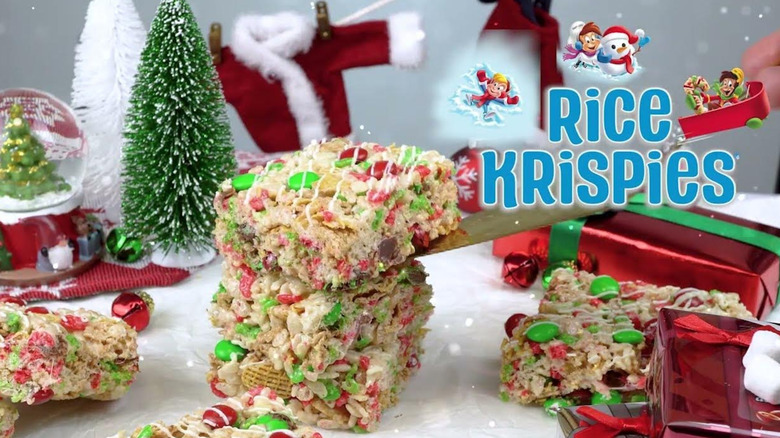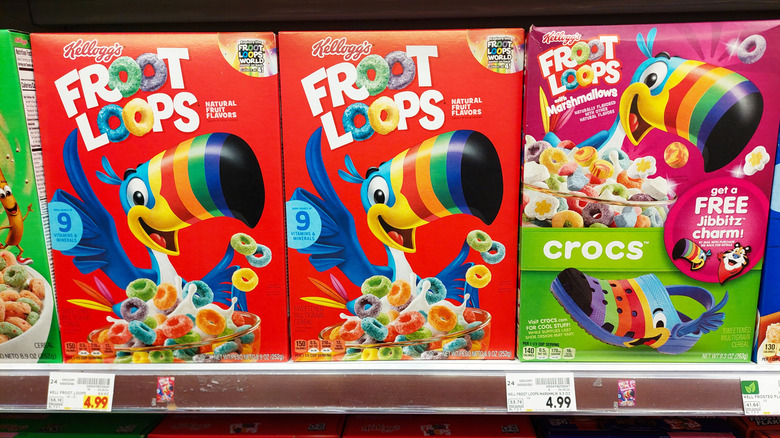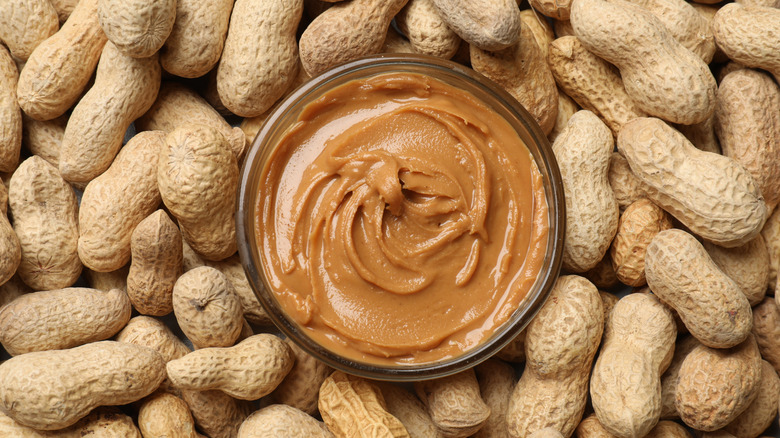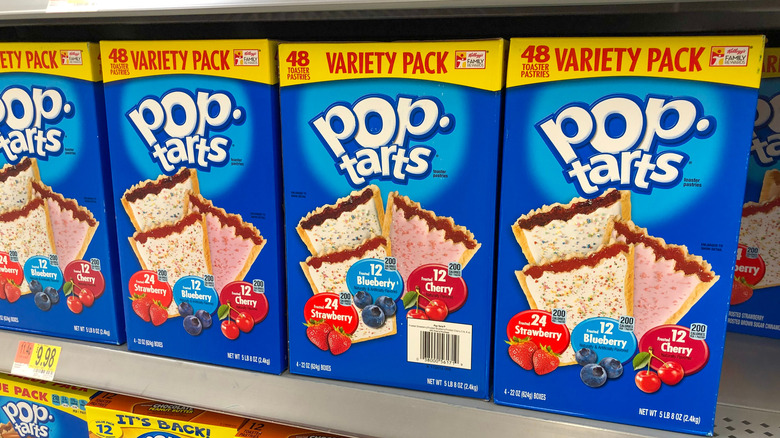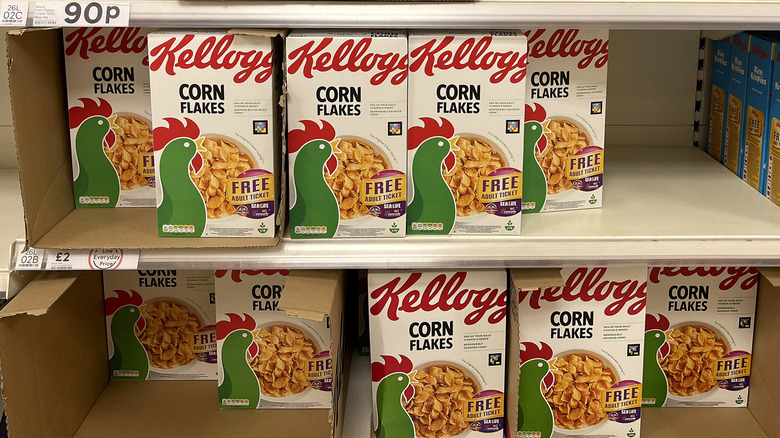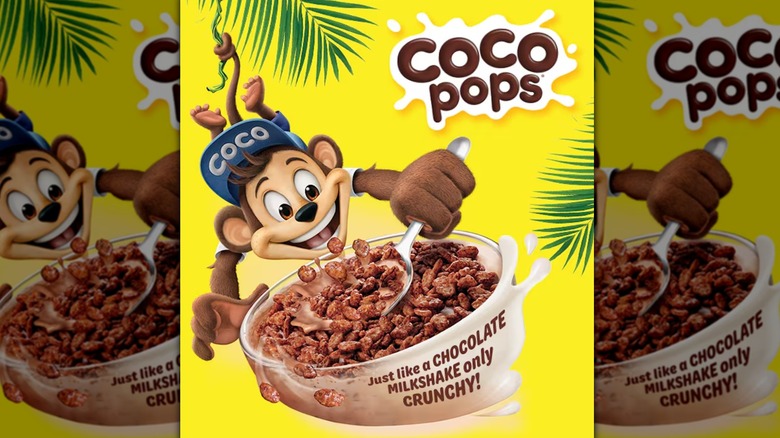Kellogg's Recalls That Affected Millions
When you peek into your pantry, what Kellogg's products can you spot? Chances are, you have a couple of boxes of Kellogg's cereals like Frosted Flakes, Froot Loops, Raisin Bran, and the original Corn Flakes. However, the company has evolved beyond its cereal-making roots. It acquired several other brands throughout the years and today, the corporation has split into two independent companies. WK Kellogg Co is behind all those famous cereal brands, and Kellanova boasts several popular snack foods, like Pop Tarts, Eggo's, Cheez-It, and Pringles.
While Kellogg's is one of the most trusted names in our kitchen, managing so many brands has its challenges. Like any major manufacturer, it's faced its fair share of recalls over the years. These food recalls happen for various reasons. Sometimes they're triggered by routine quality checks that pick up on issues with texture, flavor, or potentially harmful pathogens. Other times, they're initiated by customer complaints or illnesses traced back to specific products.
Food recalls are a sign that the food safety system is working. However, some of these recalls have affected millions, from production line workers to consumers who rely on the product. These recalls were not small blips in Kellogg's history — you may even remember some yourself. Perhaps you even had to toss a box of cereal or two, but weren't certain why. Hopefully, we can provide some answers. If not, it's still fascinating to learn the ins and outs of Kellogg's most significant recalls.
Chocolate Corn Flakes reports a major quality defect (2024)
When you take a big spoonful of Corn Flakes, you expect those individual flakes to crunch between your teeth. But what if you found a hard lump? Not only is this an unappealing texture, but it can be a choking hazard. Unfortunately, this exact scenario happened fairly recently to Kellogg's Corn Flakes Chocolate Flavor.
In 2024, several U.K. consumers complained that they were finding hard lumps in their cereal. Even when mixed with milk, these masses remained solid. To ensure quality and prevent any safety issues, Kellanova (the U.K. manufacturer of Corn Flakes) voluntarily recalled the cereal. In Kellanova's press release, a spokesperson explained, "It's important to say that the risk of injury from these hard lumps of chocolate cereal is minimal but we're not willing to compromise on quality or safety."
All boxes with best-by dates between December 6, 2024, and April 28, 2025 were recalled. This is over four months of supplies, which is bound to cost the company a pretty penny. And since the boxes were already in circulation, stores were forced to pull them off shelves while consumers were asked to check their pantries and toss the cereal. Although refunds were offered, many consumers would rather take the loss than put in that extra effort. And sadly, since breakfast cereal is declining in popularity, we'd imagine this recall doesn't help matters.
Widespread salmonella outbreak linked to Honey Smacks (2018)
What's one of the worst reasons for a food recall? Potentially when a widespread illness is traced back to a specific product. After all, it's one thing for consumers to experience an issue with flavor or taste, and it's another to be exposed to harmful pathogens. So when the CDC noticed a string of salmonella illnesses in 2018, they immediately got to work, discovering a link to Kellogg's Honey Smacks cereal.
By September 2018, the CDC reported 130 cases of salmonella from 36 states, with 34 hospitalizations. These figures are likely much higher since not everyone reports food-borne illness. Kellogg's issued a Class I recall in June 2018. For reference, recalls are classified on a scale from 1 to 3, with one being a situation with a high probability of illness or adverse health consequences. According to the Food Industry Counsel, over a million cases of Honey Smacks were recalled. These boxes contained best-by dates spanning an entire year.
The CDC explains that symptoms of salmonella poisoning can begin anywhere from six hours to six days after exposure. People can experience varying degrees of diarrhea, fever, and stomach cramps. Depending on its severity, they may require hospitalization (as was the case with many people who consumed Honey Smacks). Ultimately, we're unsure how the salmonella entered the production line. But since those Honey Smacks were already in consumer's cupboards, we hope any unreported salmonella cases were minor.
Peanuts found in several brands of cookies and crackers (2016)
Peanuts are a tricky food ingredient because so many people are allergic to them. It's one of the "Big Nine" food allergies that must be listed on food labels. But sometimes, peanuts sneak into food products where they don't belong. And if that food is a major ingredient in other products — like flour — it can cause a sourcing nightmare. Such is the case with a giant flour recall that had a domino effect on several Kellogg brands.
In 2016, Kellogg was forced to recall over 20 different products, including Special K brownies, Famous Amos snacks, and Keebler Animal Crackers due to potential peanut residue in the flour. The flour was sourced from Grain Craft. According to Food Safety News, the company "learned of the intermittent presence of peanut in the wheat flour supplied by one of our flour mills in Georgia." However, the brand could not determine how on earth the peanuts got there. The issue impacted several other companies, including Safeway, ACME, and Chick-fil-A.
Since a peanut allergy is serious business, it was considered a Class I recall. Symptoms of a peanut allergy typically come on quickly and include hives, digestive problems, or a runny nose. Worst case scenario, an allergic response can cause anaphylaxis, which would require medical intervention. And if a person doesn't have an EpiPen on them (and sometimes even if they do), they can expect a trip to the emergency room. Hopefully, food allergies can become less scary with new drugs — but until then, we'd keep an eye on those food recalls.
Eggo Waffles recalled for potential listeria (2016)
We're grateful for routine testing since it can sometimes turn up some harmful pathogens. During one of these standard tests, the Kellogg company detected listeria in its Eggo waffles. Listeria can be found in moist environments and survives food preservation. When people accidentally consume this bacteria, they may experience a variety of symptoms, depending on severity. Mild cases may include a fever and diarrhea, while severe cases can cause convulsions or even death.
Immediately following the discovery, Kellogg voluntarily recalled 10,000 cases of Nutri-Grain Whole Wheat Waffles. These products were sold in 25 states and had two different best-by dates. Eggo waffles are widely available and popular — they even made our ranking of the best frozen waffles, so consumers may have noticed less supply on store shelves. However, this is one instance where you probably should "Leggo my Eggo." And ultimately, we're just happy Kellogg caught the issue before it caused widespread illness.
Special K Red Berry cereal contaminated with glass fragments (2013)
Shoppers have found some wild items in their food, from live frogs to cold hard cash. While some items are harmless, glass is another story. It's definitely not something we want to discover in our cereal boxes, yet in 2013, Special K Red Berry cereal was recalled for this very reason.
Three sizes of the product were affected, totaling 36,000 packages. Kellogg spokesperson Kris Charles shared, "The company took this precautionary action due to the possible presence of glass fragments from a single batch of one of the ingredients," per Reuters. He assured, "This is a very small recall... We took the step out of an abundance of caution." However, the news outlet also explains that Kellogg cut too many jobs, potentially leading to more manufacturing mistakes.
Luckily, no injuries were reported. But if consumed, glass fragments can cause damage to your teeth all the way down through your intestines. Unfortunately, this isn't the only non-food item that was found in Kellogg's cereals. Hopefully, it was a wake-up call and encouraged the company to step up its manufacturing regulations.
Mini-Wheats cereal contaminated with metal (2012)
Glass wasn't the first non-food item to be discovered in Kellogg's cereal. Prior to the glass fragment fiasco, the company recalled its Mini-Wheats cereal for potentially containing metal mesh. Although the risk was low, the company recalled up to 3 million cereal boxes. This would have cost the company significant revenue and left regular customers missing the popular breakfast food.
The metal mesh most likely entered from a faulty machine part. The recall affected both the frosted and unfrosted versions of Kellogg's Mini-Wheats Bite Size cereal with several different best-by dates. According to a study published in the Official Publication of The College of Family Physicians of Canada, most metallic objects pass through the body without issue. However, if the metal is sharp or angular, it can complicate things, leading to bowel injuries or sepsis. While we're not sure of the exact shape of the metal mesh in question, we couldn't find any reports of related injuries.
Kid's baking kits recalled for undeclared allergen (2010)
When it comes to recalls, sometimes companies are guilty by association. This may happen when a company's product is part of a larger package. For example, Kellogg's Rice Krispies Treats were part of Brand Castles Holiday Village Kit. Brand Castle makes interactive baking kits for all ages and sells them under other brand names, including Kellogg's. So when this company experienced a massive recall, the Kellogg Company felt the effects, as well.
Tens of thousands of Holiday Village Kits were recalled due to an undeclared allergen. The kit contained packages of icing with egg, which the company discovered after a consumer reported an allergic reaction. The majority of these kits were sold through Michael's, and shoppers who purchased the item were offered a refund from the retail chain.
While Kellogg's doesn't actually manufacture these kits, the company contributes its name along with the Rice Krispies Treats — which, in its defense, were labeled correctly. But since this product was marketed towards kids and had an undeclared allergen, we're not surprised it was a Class I recall. Any recalls bode badly for a business, but this class can put a particular stain on a brand's name even if it's not at fault.
Several cereal brands recalled due to off-putting flavor and smell (2010)
If you opened a box of Froot Loops circa 2010, you may have been sorely disappointed. Many consumers picked up on a foul smell on the inner lining, and those brave enough to eat a bowl also observed an uncharacteristic flavor. This phenomenon didn't only impact Froot Loops. It plagued several of Kellogg's cereals, including Corn Pops, Honey Smacks, and Apple Jacks. The consumer complaints led to a recall of all four cereals with multiple best-by dates.
It's unusual that a recall is associated with consumers noticing a difference in flavor and smell. And truthfully, we're not entirely sure what was behind this off-putting smell or flavor. Kellogg's assured the public that the risk of serious health consequences was low. However, the brand also mentioned that temporary symptoms could include nausea and diarrhea, which has us even more confused as to the original cause. Regardless of the reasoning, we're happy the Kellogg Company maintained a high level of quality control. When we open a box of Kellogg's cereal, we expect a specific experience — and if the product is unreliable, we're far less likely to return for more.
Massive peanut butter recall affects Kellogg's cookies and cracker companies (2009)
2009 saw one of the biggest peanut butter recalls of all time. The CDC reported a multi-state outbreak of salmonella infections which appeared to come from the same strain. This led to a huge investigation uncovering over 714 infections and nine deaths associated with the outbreak. The CDC also discovered that infected individuals had consumed peanut butter or peanut butter products prior to falling ill. The peanut butter products were sold by several companies, including the Kellogg's-owned Keebler and Austin brands. But one thing they all had in common? They sourced peanut butter from the Peanut Corporation of America.
According to ABC News, the Kellogg company was forced to recall 16 products as a result of the outbreak, including Keebler cheese and peanut butter sandwich crackers and Keebler and Famous Amos peanut butter cookies. While these recalls greatly impacted Kellogg's company, they destroyed the Peanut Corporation of America. Food Safety News reports that the negligence of this corporation caused over 3,900 products to be recalled, totaling over $1 billion in losses. The outlet also shared that the Peanut Corporation of America filed for bankruptcy in early 2009, which isn't surprising considering the severity of monetary losses and the widespread health issues.
Pop Tarts flavor mix-up caused undeclared milk allergen (2006)
Have you ever bit into a snack only to discover a completely different flavor than expected? Packaging mix-ups happen to the best of us, and the Kellogg Company is no exception. In 2006, the Kellogg-owned Pop Tarts accidentally placed Hot Fudge Sundae Pop Tarts in products labeled as Frosted Blueberry. Both flavors may be delicious, but the Hot Fudge Sundae contained milk products, while the Frosted Blueberry did not.
Since these products had an undeclared milk allergen, Kellogg was forced to issue a Class I recall. The Food Industry Counsel registered over 32,000 pounds in lost merchandise. Luckily, the company caught this mixup in time, as no allergic reactions were reported, which is a relief seeing how milk is one of the "Big Nine" food allergies. According to the Cleveland Clinic, 2% of U.S. kids have a milk allergy which can cause anything from nausea and stomach pain to anaphylaxis. However, people are even more likely to have lactose intolerance. Although typically not as severe as an allergic reaction, lactose intolerance can lead to a host of uncomfortable symptoms like bloating and gas.
Special K cereal packaged in Corn Flakes box (2004)
Despite Corn Flakes' long, storied history, it's stood the test of time. People love the simplicity of these crunchy golden flakes and many have come to crave it every morning. So you can imagine their surprise when they poured a bowl and got Special K cereal, instead. Special K also has flakes, but the cereal is lighter and puffier. It also has a less pronounced corn flavor and isn't quite as sweet, which is partly why it made our ranking of the best healthy cereals.
According to Food Industry Counsel, this mixup led to a recall of over 85,000 pounds of cereal. However, the recall wasn't merely issued to avoid disappointed customers. The mislabeled product contained undeclared milk and wheat ingredients. Corn Flakes are already made with malt flavor, making them unsafe for gluten-sensitive individuals. However, the cereal is free of milk or wheat, unlike Special K. So if consumers avoided these food products, they would have no way of knowing this cereal contained them.
Coco Pops and Rice Bubbles contaminated with metal wires (2004)
Never heard of Coco Pops and Rice Bubbles? You definitely have, just under a different name. These are the Australian equivalent of Cocoa Puffs and Rice Krispies. We're unsure why these popular cereals are referred to differently in Australia and New Zealand. Perhaps 'puffs' and 'krispies' were too American for their liking. But names aside, these Kellogg cereals are essentially the same as their American counterparts. And much like many U.S. Kellogg products, they also experienced a serious recall.
Kellogg recalled both these cereals after a customer discovered thin pieces of wire in the box. The company issued a statement saying "Kellogg apologises to all our consumers, and thanks those who alerted the company to the incident," per ABC News. Kellogg also assured customers that this was an isolated incident and they would be fully compensated when returning affected products. The products included Coco Pops and Rice Bubbles sold in Australia and New Zealand with best-by dates of April 28, 29, and 30 of 2005.
